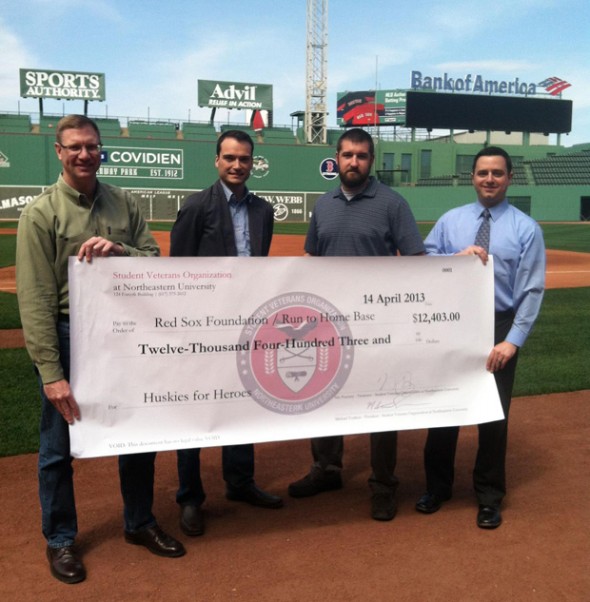
From left to right: David Vacchi, Michael Trudeau, Nic Pszenny, and Andrew McCarty hold up a check for the Run to Home Base Program at Fenway Park. Trudeau, president of Northeastern’s Student Veterans Organization, met Vacchi, who had been conducting research for his doctorate on the university’s campus, through their work on the Massachusetts Student Veterans Advisory Board.
On Saturday, May 4, Northeastern’s Huskies for Heroes participated in a nine-kilometer fundraising run through Boston and across home plate at Fenway. The team raised over $27,000 in support of the Red Sox Foundation and Massachusetts General Hospital Home Base Program. College of Professional Studies student-veteran Nic Pszenny led the team and discussed the goal of the run in an interview with NECN.
The Home Base Program serves veterans of the Iraq and Afghanistan wars who suffer from combat stress and traumatic brain injury. According to the program’s literature, invisible wounds of war affect 30 percent of soldiers who have served in either country.
The race—dubbed the 2013 Run-Walk to Home Base—starts on Yawkey Way and finishes in Fenway Park at home plate.
Pszenny founded the Huskies for Heroes team, which raised more than quadruple the amount of last year’s total. The team raised $8,000 by auctioning off commemorative camouflage jerseys and socks worn my members of the men’s hockey team on Veterans Day weekend.
“I am very happy that people stepped up to participate,” said Pszenny, a graduating senior studying leadership. The Home Base program, he added, is “leading the charge” in treating wounded veterans with post-traumatic stress and traumatic brain injury.
Andrew McCarty, an Air Force veteran and Northeastern’s veteran services specialist, agreed with Pszenny’s assessment of the program’s value. “I certainly have turned to the Home Base Program for help with particular issues,” he said. “It is good to know that there is an organization out there that is dedicated to helping this specific population.”
The Boston Marathon bombings have enhanced the significance of this year’s run, according to both Pszenny and McCarty, who participated in the five-and-a-half-mile event. In honor of the victims of the twin bombings, every member of the Huskies for Heroes team wore a ribbon inscribed with the date of the attack.
“This was the first big running event in the city following the bombings,” Pszenny said. He noted that two Northeastern student-veterans who participated in Saturday’s run also ran the marathon, saying, “It was emotional for a lot of people.”
Added McCarty: “This is another way for the Boston community to come together. It was be healing and invigorating.”
The Northeastern student veteran’s community is already very close—and well respected. At the beginning of the year, the Student Veterans of America recognized Northeastern’s Student Veterans Organization as its top chapter in the United States.
Northeastern, for its part, has developed a strong commitment to educating student veterans through the federal government’s Yellow Ribbon Program, which currently provides free tuition to more than 130 veterans who have served in the post-9/11 era. In 2009, the university pledged $2 million to help veterans earn a college education through the program, which offers students access to bachelor’s, master’s, doctoral, and law degrees.
McCarty said student veterans bring a unique worldview to the Northeastern community, owing to their vast international and cultural experiences. “Student veterans tend to be leaders within the organizations they join,” he explained.